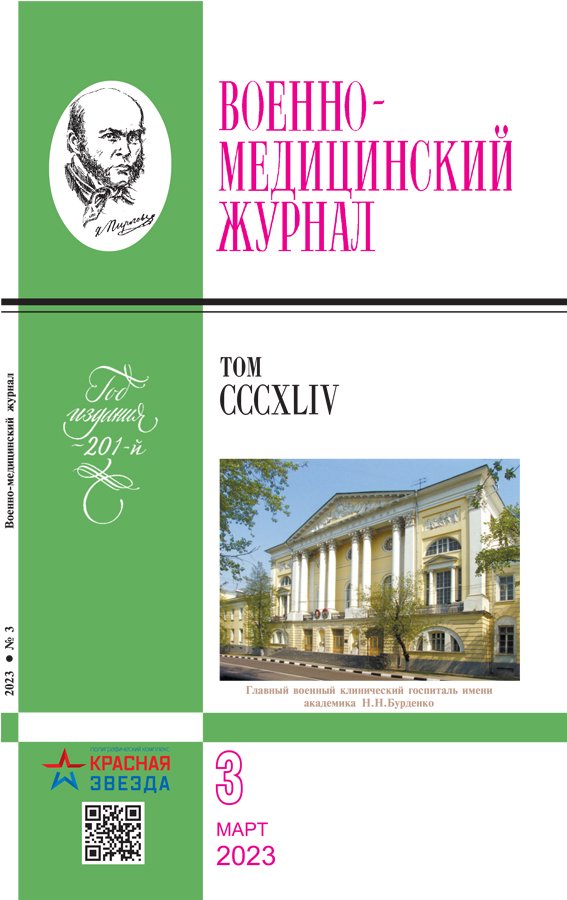Yersiniosis: features of the course, diagnosis and treatment
- 作者: Sorokin A.N.1, Solov’ev M.V.1, Raevskii K.P.1, Voskresenskaya E.A.2, Kokorina G.I.2, Bogumilchik E.A.2
-
隶属关系:
- The S.M.Kirov Military Medical Academy of the Ministry of Defense of the Russian Federation
- St. Petersburg Pasteur Research Institute of Epidemiology and Microbiology
- 期: 卷 344, 编号 3 (2023)
- 页面: 56-62
- 栏目: Epidemiology and infectious diseases
- URL: https://journals.eco-vector.com/0026-9050/article/view/630031
- DOI: https://doi.org/10.52424/00269050_2023_344_3_56
- ID: 630031
如何引用文章
详细
Scientific literature data and clinical practice show a significant role of Yersinia in the genesis of chronic intestinal inflammation in several patients. The aim of this study was to determine the features of the course, diagnosis and treatment of inflammatory bowel diseases in patients with identified markers of yersiniosis. We examined 22 patients with chronic relapsing course of inflammatory bowel diseases in the acute phase, who, despite the ongoing therapy, retained signs of the disease. To establish a yersinia etiology of the disease, additional laboratory tests of blood and feces were performed: detection of pathogenic yersinia by bacteriological and polymerase chain reaction methods, as well as determination of specific anti-yersinia antibodies by enzyme immunoassay and immunoblot. All examined patients received conventional anti-inflammatory and/or immunosuppressive therapy. Because of empirical antibiotic therapy, improvement in clinical parameters was achieved in 24% of patients. Clinical remission was observed in the early stages in 57% of patients receiving etiotropic antibiotic therapy. Experience shows that the achievement of remission of inflammatory bowel diseases with the use of various antibacterial agents in most cases is associated with their use as a starting antibiotic therapy.
作者简介
A. Sorokin
The S.M.Kirov Military Medical Academy of the Ministry of Defense of the Russian Federation
编辑信件的主要联系方式.
Email: arsenysorokin@mail.ru
лейтенант медицинской службы
俄罗斯联邦, Saint PetersburgM. Solov’ev
The S.M.Kirov Military Medical Academy of the Ministry of Defense of the Russian Federation
Email: arsenysorokin@mail.ru
кандидат медицинских наук, подполковник медицинской службы
俄罗斯联邦, Saint PetersburgK. Raevskii
The S.M.Kirov Military Medical Academy of the Ministry of Defense of the Russian Federation
Email: arsenysorokin@mail.ru
俄罗斯联邦, Saint Petersburg
E. Voskresenskaya
St. Petersburg Pasteur Research Institute of Epidemiology and Microbiology
Email: arsenysorokin@mail.ru
кандидат биологических наук
俄罗斯联邦, Saint PetersburgG. Kokorina
St. Petersburg Pasteur Research Institute of Epidemiology and Microbiology
Email: arsenysorokin@mail.ru
俄罗斯联邦, Saint Petersburg
E. Bogumilchik
St. Petersburg Pasteur Research Institute of Epidemiology and Microbiology
Email: arsenysorokin@mail.ru
俄罗斯联邦, Saint Petersburg
参考
- Бакулин И.Г., Скалинская М.И., Маев И.В. и др. Фармакотерапия воспалительных заболеваний кишечника: управление эффективностью и безопасностью // Тер. архив. – 2021. – Т. 93, № 8. – C. 841–852.
- Волынец Г.В., Хавкин А.И. Воспалительные заболевания кишечника и лекарственно индуцированное поражение печени // Эксперим. и клинич. гастроэнтерология. – 2021. – № 10. – С. 138–146.
- Ивашкин В.Т., Шелыгин Ю.А., Абдулганиев Д.И. и др. Рекомендации Российской гастроэнтерологической ассоциации и Ассоциации колопроктологов России по диагностике и лечению взрослых больных язвенным колитом // Рос. журн. гастроэнтерологии, гепатологии, колопроктологии. – 2015. – Т. 16, № 1. – С. 48–65.
- Маев И.В., Шелыгин Ю.А., Скалинская М.И. и др. Патоморфоз воспалительных заболеваний кишечника // Вестн. РАМН. – 2020. – Т. 75, № 1. – С. 27–35.
- Назаров В.Е., Воскресенская Е.А., Ценева Г.Я. и др. Иерсиниозы – новые «терапевтические» инфекции в гастроэнтерологической практике? // Клинич. перспективы гастроэнтерологии, гепатологии. – 2015. – № 6. – С. 16–24.
- Никонов Е.Л., Аксёнов В.А., Скворцова Т.А. и др. Иммунотерапия воспалительных заболеваний кишечника // Доктор.Ру. – 2019. – Т. 10, № 165. – С. 31–37
- Сагынбаева В.Э., Голованова Е.В., Лазебник Л.Б. и др. Иерсиниоз – причина развития внекишечных воспалительных заболеваний кишечника или признак реактивации оппортунистических инфекций на фоне биологической терапии? // Эксперим. и клинич. гастроэнтерология. – 2018. – № 5. – С. 78–85.
- Шапина М.В., Халиф И.Л. Применение препаратов 5-аминосалициловой кислоты для лечения язвенного колита в различных режимах дозирования // Медицинский совет. – 2017. – № 15. – C. 44–50.
- Bonovas S., Nikolopoulos G.K., Lytras T. et al. Comparative safety of systemic and low-bioavailability steroids in inflammatory bowel disease: Systematic review and network meta-analysis // Br. J. Clin. Pharmacol. – 2018. – Vol. 84, N 2. – P. 239–251.
- De Berardis B., Torresini G., Brucchi M. et al. Yersinia enterocolitica intestinal infection with ileum perforation: report of a clinical observation // Acta Biomed. – 2004. – Vol. 75, N 1. – P. 77–81.
- Payne M., Girdwood A.H., Roost R.W. et al. Yersinia enterocolitica and Crohn’s disease. A case report // South Afr. Med. J. – 1987. – Vol. 72, N 1. – P. 53–55.
- Rhodes J.M. The role of Escherichia coli in inflammatory bowel disease // Gut. – 2007. – Vol. 56, N 5. – P. 610–612.
- Turner D., Ruemmele F.M., Orlanski-Meyer E. et al. Part 2: Acute severe colitis – an evidence-based consensus guideline from the European Crohn’s and colitis organization and the European society of paediatric gastroenterology, hepatology and nutrition // J. Pediatr. Gastroenterol. Nutr. – 2018. – Vol. 67, N 2. – P. 292–310.
- Wei B., Huang T., Dalwadi H. et al. Pseudomonas fluorescens encodes the Crohn’s disease-associated 12 sequence and T-cell superantigen // Infect. Immun. – 2002. – Vol. 70, N 12. – P. 6567–6575.
- Yoon J.Y., Cheon J.H., Park J.J. et al. Clinical outcomes and factors for response prediction after the first course of corticosteroid therapy in patients with active ulcerative colitis // J. Gastroenterol. Hepatol. – 2011. – Vol. 26, N 7. – P. 1114–1122.
补充文件






